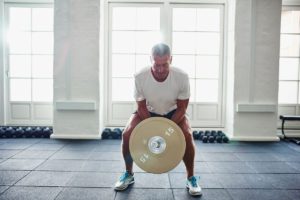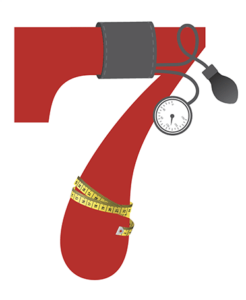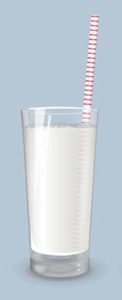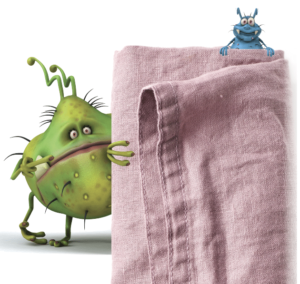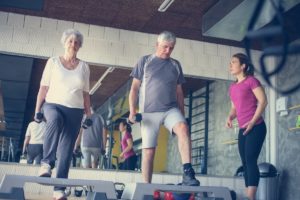Wellness
Mindful Movement May Reduce Stress and Anxiety
Encouraging clients to increase body awareness and pay attention to their surroundings when being physically active may reduce stress.
Stay Strong to Increase Longevity
Here’s more motivation to stay on top of your functional strength training program. Researchers from China and Indiana University analyzed data from 4,449 older adults in the National Health and Nutrition Examination Survey and found that older people with low muscle strength had more than twice the risk of dying during the study than those with normal muscle strength.
Dehydration Impairs Cognitive Performance
Keep reminding clients to drink plenty of fluids. New research shows that cognitive abilities—attention, coordination, complex problem solving and reaction time—begin to decline with as little as 1% loss of body mass from dehydration, with more severe impairments showing up at 2%. Dehydration affects attention first and with more severity than other cognitive abilities.
Healthy Habits Save Lives
A healthy lifestyle—including being physically active, eating a nutritious diet and not smoking—plays a significant role in living a longer, healthier life. This conclusion emerged from an observational study of 7,000 men and women aged 25–74 who were periodically assessed over a 35-year period. Researchers based the analysis on the American Heart Association’s definition of ideal cardiovascular health. This definition includes absence of clinical heart disease, together with positive outcomes on “Life’s Simple 7” health metrics:
Full-Fat Dairy Makes a Comeback?
An ever-expanding pile of research papers is challenging the idea that we need to avoid full-fat varieties of dairy products like yogurt and milk. There may be no need to settle for fat-free versions that could be less satisfying: For instance, a new study published in The American Journal of Clinical Nutrition involving more than 2,900 U.S. seniors aged 65 and above found that whole-fat dairy consumption appears to do little harm when it comes to cardiovascular disease.
Are Your Kitchen Towels Buggy?
A potential danger lurking in kitchens could put us at risk for food poisoning. Household kitchen towels can expose people to dangerous pathogens, including E. coli and Staphylococcus, according to research presented at the June 2018 annual meeting of the American Society for Microbiology. Towels destined for multiple purposes, such as drying hands and wiping utensils, were found to have a higher bacterial count than single-use towels.
Use Stress to Fuel Peak Performance
You’ve been training for a 10K. You’re ready, but when you show up on race day, your heart is pounding and you feel panicked. What should you do to lower your stress? Some people might say, “Take a deep breath.” We all know that deep breathing to calm the nervous system is a go-to strategy for dealing with stress. But is it always the best strategy?
Can You Benefit From Failure?
Failure: It’s the problematic F-word that the fitness industry rarely cares to discuss. We’ve all experienced failure to one degree or another—and so have our clients. But you’d hardly know it. After all, this is an industry where being positive and motivating is our specialty. We push success, and we push it hard, leaving little room for clients to feel accepted and supported during periods of low success or even spectacular failure. Some people who fall off the workout wagon might simply feel safer fading away from fitness rather than answering to a trainer with a staunch #noexcuses attitude.
A Defense Against Age-Related Slowing
Age-related slowing of movement plays a critical role in the declining health of older adults. Slowing typically begins after age 62 with a marked decrease in gait velocity. It can lead to dysfunction, poor mental and physical health, a loss of independence and higher risk of mortality.
An Action Plan to Combat Adolescent Obesity
Health and fitness professionals can drive positive outcomes and minimize the risk adolescent obesity with these five “rules” for coaching.
Mindful Exercise in the Pool
The sensory-rich pool environment is an ideal setting for mindful exercise and a welcome respite from digital stress.
Obesity Boosts Melanoma Risk
Add this to the list of dangers associated with obesity: New research from Sweden suggests obesity is a risk factor for developing skin cancer, and weight loss—in this case via bariatric surgery—could reduce the risk of malignant melanoma skin cancer, in particular, by 61%.
The study included 2,007 bariatric surgery patients and 2,040 nonsurgery controls whose skin cancer incidence was monitored for 18 years. Aside from the significantly lower risk of developing malignant melanoma, the surgery group saw a 42% reduction in skin cancer risk in general.
Question of the Month
Do you make a point to limit social media use? If so, how do you think that has affected your personal and professional life?
Send your responses to Joy Keller, jkeller@ideafit.com.
Cutting Facebook Lowers Stress Levels
Need to cut some stress out of your life? Researchers from the University of Queensland in Australia say that taking breaks from Facebook can help.
Their study included 138 active Facebook users who were asked to either take a 5-day fast from the social media platform or maintain current usage. Each person self-reported on their well-being and stress levels and underwent salivary cortisol tests before and after the intervention.
The Peak of Fitness
The mountains are calling. The jagged and distinctive Dolomite range—part of the Italian Alps in northeastern Italy—features 90,000 acres of mountainous terrain, perfect for outdoor adventure enthusiasts from across the globe, including a dedicated group led by PJ O’Clair, owner of ClubXcel and Northeast Pilates Education Center and a cycling enthusiast.
Too Little Or Too Much Sleep Poses Health Risks
National University College of Medicine in South Korea warns that sleeping more than 10 hours a night might be worse.
The Optimal Amount of Exercise for Heart Health
Arterial stiffness, which increases with sedentary living, is associated with higher risk of heart disease. It’s well known that exercise can help, but how much—or how little—is enough?
“While near-daily, vigorous lifelong (>25 years) endurance exercise training prevents arterial stiffening with ageing, this rigorous routine of exercise training over a lifetime is impractical for most individuals,” noted the authors of a new study, which aimed to determine the least amount of exercise necessary to reduce arterial stiffness.
Exercise Doesn’t Slow Dementia, Say Researchers
Research has supported exercise as having the potential to keep dementia at bay or at least to impede its progression. A recent study suggests that physical activity may not be as effective at warding off cognitive decline as previously thought.
In this study, published in BMJ (2018; 361, k1675), 329 individuals were assigned to an exercise intervention, while 165 subjects received “usual care.” Average age was 77, and each participant had a clinically confirmed dementia diagnosis.
How Fast You Walk May Affect How Long You Live
Want to outwalk the grim reaper? Pick up the pace, say researchers. A new study from the United Kingdom suggests that quicker walking may add years to your life.
The study’s primary aim was to examine the impact of walking pace and volume on all-cause mortality. To determine this, researchers looked at mortality records for 50,225 individuals from Scotland and England who had self-reported their walking data via interview.
Weight Training’s Surprising Effects on Depression
Could a cure for depression be found in the weight room? Data from a study published in JAMA Psychiatry (2018; 75 [6], 566–76) points to that conclusion. The meta-analysis of 33 clinical trials, featuring 1,877 participants, found a link between resistance training (RET) and a reduction in depressive symptoms.

